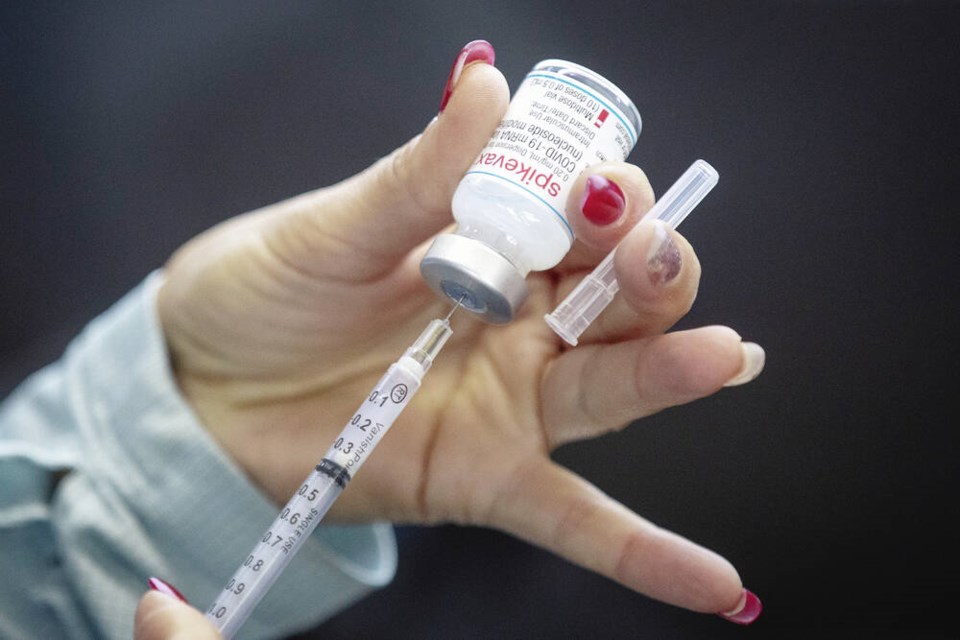The newest COVID-19 vaccines, if approved by Health Canada, are expected to arrive in B.C. at the end of September, with shots to be delivered in early October, provincial health officer Dr. Bonnie Henry said Monday.
“We’ll have the updated COVID vaccine as well as the flu vaccines in early October and that’s the best time for people to get vaccinated,” Henry said in an interview. “By mid-October we should be well into the vaccine campaign program both for influenza and COVID.”
When the vaccines are available, people will be able to receive one or both shots through pharmacies, physicians’ offices or public health clinics.
The latest formulation of the COVID-19 mRNA vaccine by Pfizer-BioNTech and Moderna has been under review by Health Canada and Henry hopes the vaccine — Moderna had its application in first — will be approved this week.
The new formulation is a monovalent vaccine, consisting of one Omicron subvariant, XBB.1.5, and is expected to be effective against other circulating Omicron strains EG.5 and XBB.1.16 as well as BA.2.86, of which there’s been one reported case in B.C.
The National Advisory Committee on Immunization suggested in July that people get the updated vaccine if it has been six months or more since their last dose or infection. It advised that COVID-19 vaccines can be given on the same day as other vaccines, or at any time before or after.
The COVID-19 vaccine in B.C. is now seen as similar to the flu shot, created annually to match as close as possible the strain of virus or viruses in circulation, said Henry.
It’s too early to say whether COVID-19 shots will become an annual fall vaccine.
In recent weeks, the province has seen a rise in COVID-19 numbers with cases, hospitalizations and deaths all up.
The B.C. Centre for Disease Control says in a monthly that 447 people were positive in tests funded by the province’s Medical Services Plan in the week ending Sept. 2, versus 133 in the week ending Aug. 12.
On Sept. 7, a total of 241 people with COVID-19 were in hospital across B.C., with weekly admissions increasing from 95 in the week ending Aug. 12 to 136 two weeks later, before dipping to 119 new cases.
The centre says the number of deaths rose from eight in the first week of the reporting period to 15, then dipped to 12.
Over the past four weeks, four COVID-19 outbreaks were reported in acute-care facilities and one outbreak was reported in a long-term care facility. While there are cases at Vancouver Island facilities, no outbreaks have been declared.
Henry said overall cases remain low — a “fraction of what we saw this time last year” — and are not unexpected.
SARS-CoV-2, the virus that causes COVID, seems to be following the pattern of other respiratory viruses, like influenza and respiratory syncytial virus, which start to ramp up in the fall, Henry said
As people spend more time indoors, Henry recommended increasing infection prevention, such as regular hand washing, staying home when sick “especially if you have a fever or cough,” and getting updated COVID-19 and flu vaccines when they’re available. Experts also recommend improving indoor ventilation.
The province is reviewing whether to re-introduce a mask mandate in health-care settings during the fall and winter.
Health Minister Adrian Dix, speaking to media at Surrey Memorial Hospital last week, said the province’s emergency rooms are seeing unusually high patient demand that is especially concerning as the province enters the respiratory illness season.
Henry said B.C. is not alone in seeing an increase in ER visits amid continuing staffing shortages.
“We’re definitely in a tougher place in the hospitals,” said Henry. “It is going to be really, really important that we all take all of the measures that we can to reduce our own risk, but also the risk of people around us getting sick with influenza, with COVID, with RSV.
“Getting up to date on the flu vaccine and on the COVID vaccines is a really important part of that.”
>>> To comment on this article, write a letter to the editor: [email protected]




